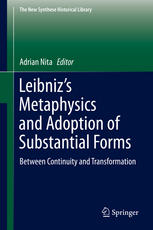

Most ebook files are in PDF format, so you can easily read them using various software such as Foxit Reader or directly on the Google Chrome browser.
Some ebook files are released by publishers in other formats such as .awz, .mobi, .epub, .fb2, etc. You may need to install specific software to read these formats on mobile/PC, such as Calibre.
Please read the tutorial at this link: https://ebookbell.com/faq
We offer FREE conversion to the popular formats you request; however, this may take some time. Therefore, right after payment, please email us, and we will try to provide the service as quickly as possible.
For some exceptional file formats or broken links (if any), please refrain from opening any disputes. Instead, email us first, and we will try to assist within a maximum of 6 hours.
EbookBell Team

4.1
50 reviewsThis anthology is about the signal change in Leibniz’s metaphysics with his explicit adoption of substantial forms in 1678-79. This change can either be seen as a moment of discontinuity with his metaphysics of maturity or as a moment of continuity, such as a passage to the metaphysics from his last years.
Between the end of his sejour at Paris (November 1676) and the first part of the Hanover period, Leibniz reformed his dynamics and began to use the theory of corporeal substance. This book explores a very important part of the philosophical work of the young Leibniz.
Expertise from around the globe is collated here, including Daniel Garber’s work based on the recent publication of Leibniz's correspondence from the late 1690s, examining how the theory of monads developed during these crucial years. Richard Arthur argues that the introduction of substantial forms, reinterpreted as enduring primitive forces of action in each corporeal substance, allows Leibniz to found the reality of the phenomena of motion in force and thus avoid reducing motion to a mere appearance.
Amongst other themes covered in this book, Pauline Phemister’s paper investigates Leibniz’s views on animals and plants, highlighting changes, modifications and elaborations over time of Leibniz’s views and supporting arguments and paying particular attention to his claim that the future is already contained in the seeds of living things. The editor, Adrian Nita, contributes a paper on the continuity or discontinuity of Leibniz’s work on the question of the unity and identity of substance from the perspective of the relation with soul (anima) and mind (mens).